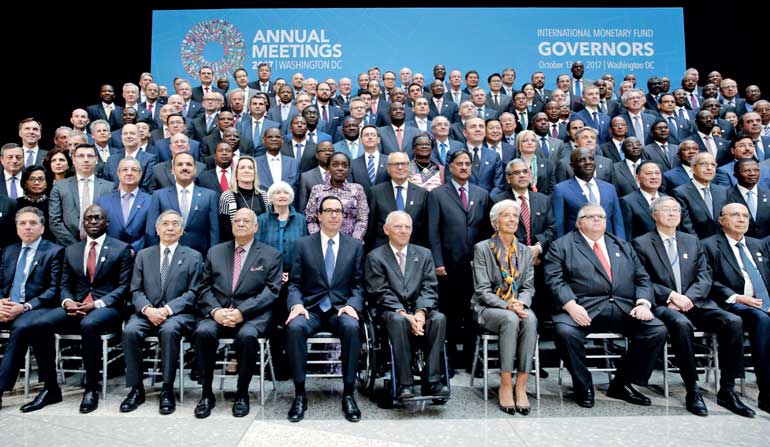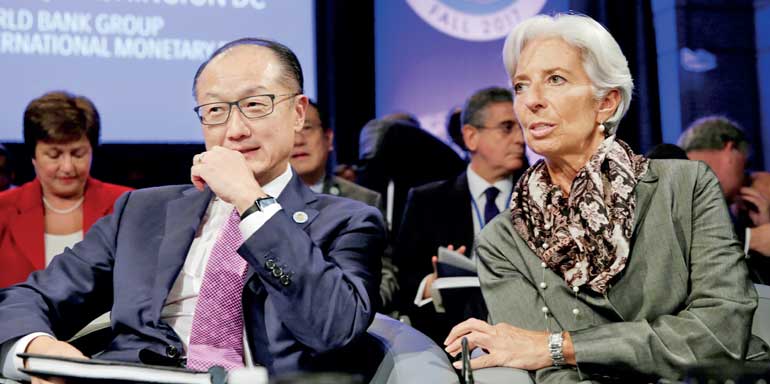Monday Feb 23, 2026
Monday Feb 23, 2026
Monday, 16 October 2017 00:00 - - {{hitsCtrl.values.hits}}
WASHINGTON (Reuters): International Monetary Fund members gave lukewarm endorsement to a strengthening global economy but conceded they were not out of the woods as they grappled with subdued inflation, low potential growth and an uneven recovery that clouded the outlook.

IMF Governors family photo during the IMF/World Bank annual meetings in Washington, U.S., October 14, 2017. REUTERS
With central banks left with less firepower and some seeking to exit crisis-mode stimulus measures, the IMF members also renewed calls for fiscal policy and structural reforms to carry more of the burden in solidifying the recovery, now that the worst days of the economic storm had passed.
“Structural reforms that were difficult to do in hard times would be much easier in better times because the outlook is stronger,” IMF Managing Director Christine Lagarde told reporters on Saturday.
“It’s when the sun is shining that you need to fix the roof. That message was received 100 percent (by the policymakers).”
A communique from the IMF’s steering body, the International Monetary and Financial Committee (IMFC), said a global economic upswing, driven by a pickup in investment, trade and factory output, was brightening the outlook.
But it warned policymakers against complacency, saying that the recovery was “not yet complete” with inflation below target and potential growth weak in many countries.
Financial leaders attending the meeting also warned that while economies had improved in many countries there were people who had been left behind.
“We’re still an economy with our head in the oven and our feet in the freezer. So for the people with their feet in the freezer, that doesn’t resonate with them if you say everything’s on track,” said Bank of Canada Governor Stephen Poloz.

World Bank President Jim Yong Kim and International Monetary Fund (IMF) Managing Director Christine Lagarde attend a Development Committee plenary during the IMF/World Bank annual meetings in Washington, US, 14 October – REUTERS/Yuri Gripas
Patience needed
The optimism on global growth was overshadowed by tensions on trade, which was in full show in contentious talks to renew the North American Free Trade Agreement (NAFTA) held during the IMF’s autumn meetings.
The communique made no mention of trade, though Lagarde sought to offer a bright note by saying it was “perfectly legitimate” to renew long-standing trade agreements to respond to a changing world.
“Trade is a very powerful engine of growth, innovation, competition and productivity ... Hopefully if it is well done, it can be a win-win for all countries in those negotiations,” she said, when asked about the NAFTA talks.
The communique said member countries agreed to work together to reduce “excessive global imbalances,” and to look more carefully at potential side-effects that prolonged low interest rates could have on asset prices and economic activity.
Policymakers also had less to cheer on inflation and wages, which remain weak despite a strengthening recovery that prompted the IMF to upgrade its global growth forecast.
Bank of Japan Governor Haruhiko Kuroda said that while subdued price and wage growth has become a common phenomenon in advanced economies, it was ”only a question of time“ for them to accelerate as the economy gathers momentum.”
European Central Bank head Mario Draghi said the key was patience.
“The bottom line in terms of policy is that we are confident that as the conditions will continue to improve, the inflation rate will gradually converge in a self-sustained manner,” he said.
“But together with our confidence, we should also be patient because it’s going to take time.”
Washington (Reuters): The US economy remains strong and the strength of the labor market calls for continued gradual increases in interest rates despite subdued inflation, Federal Reserve Chair Janet Yellen said on Sunday.
“We will be paying close attention to the inflation data in the months ahead,” Yellen said in prepared remarks at an international banking seminar in Washington. “My best guess is that these soft readings will not persist.”
Yellen also said she expected the U.S. economy to exceed its long-term trend during the second half of the year and repeated the impact of recent hurricanes on the economy should be temporary.
The US central bank voted to hold interest rates steady at its last policy meeting in September. Since then, Yellen has repeatedly acknowledged rising uncertainty on the path of inflation, which has been retreating from the Fed’s 2% target rate for much of the year.
Minutes from the meeting, released last Wednesday, showed policymakers had a broad debate about recent soft inflation and the impact on interest rates if it fails to rebound.
However, Yellen and some other key policymakers have also made plain they expect to continue to gradually raise interest rates given the strength of the overall economy and continued tightening of the labor market.
Fed officials largely shrugged off a weak jobs report for September and pinned the decline in employment on Hurricanes Harvey and Irma temporarily displacing workers.
In her speech, Yellen said the most recent wage gains contained in the September jobs report were encouraging and that she expected the central bank to raise interest rates further.
“We continue to expect that the ongoing strength of the recovery will warrant gradual increases in that rate to sustain a healthy labor market and stabilize inflation around our 2% longer-run objective.”
The Central Bank has raised interest rates four times in its tightening cycle which began in late 2015. The Fed currently predicts one more rate rise this year and three the next.
The Fed has two more scheduled meetings this year, in November and December. Investors currently see the Fed raising interest rates in December.